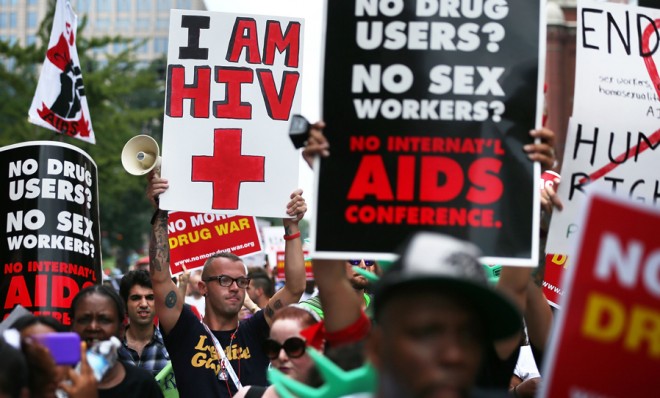Breakthrough: Is an HIV cure just a few months away?
Clinical trials for a new technique pioneered by Danish researchers are underway, and doctors are optimistic

A free daily email with the biggest news stories of the day – and the best features from TheWeek.com
You are now subscribed
Your newsletter sign-up was successful
Danish researchers are readying human trials for a potentially life-saving new HIV treatment. Already, when tested on infected human skin cells, the technique has proved effective at killing the virus. And if the treatment is deemed a success in human trials, we might be just a few months away from a bona fide cure.
The process can be best understood in two main steps:
1. Normally, HIV hides out in "reservoirs" it builds for itself inside infected cells. But this treatment flushes HIV from behind its battlements using a class of compounds called HDAC inhibitors, which are typically used to treat cancer.
The Week
Escape your echo chamber. Get the facts behind the news, plus analysis from multiple perspectives.

Sign up for The Week's Free Newsletters
From our morning news briefing to a weekly Good News Newsletter, get the best of The Week delivered directly to your inbox.
From our morning news briefing to a weekly Good News Newsletter, get the best of The Week delivered directly to your inbox.
2. Once HIV is flushed from its hideout, the body's own immune system — turbocharged by a separate vaccination — can then seek out the newly vulnerable virus and eliminate it. The hope is that every single bit of the virus is eradicated.
Now, the treatment is hardly bulletproof. "The challenge will be getting the patients' immune system to recognize the virus and destroy it," Dr. Ole Sogaard, a senior researcher at the Aarhus University Hospital in Denmark, tells the Telegraph. "This depends on the strength and sensitivity of individual immune systems." That said, the initial findings are "promising," says Sogaard.
In January, the initial round of in vitro research was deemed such a rousing success that the Danish Research Council awarded the Danish team an additional $2 million to go ahead and proceed with clinical trials, in which 15 of the nation's 5,500 HIV-infected patients will be asked to undergo the experimental treatment. If "cured," the next step will be to test the technique on a much wider scale.
Successful clinical trials would present a rare bright spot in the ongoing battle against HIV. Last week, U.S. trials for a potential AIDS vaccine were called off after the National Institute of Allergy and Infectious Diseases found the treatment — HVTN 505 — statistically ineffective compared to a placebo. (A cure differs from a vaccine in that the former works on people who have already contracted the virus.)
A free daily email with the biggest news stories of the day – and the best features from TheWeek.com
As the Telegraph notes, "with modern HIV treatment, a patient can live an almost normal life, even into old age, with limited side effects." The downside, of course, is a lifetime of expensive, ongoing medication: Once treatment is halted, HIV reservoirs can again become active to produce the virus. That's why researchers are scrambling for a cure.
Back in March, doctors were able to "functionally cure" a newborn, HIV-positive girl with aggressive anti-retroviral drugs starting just 30 hours after birth. Once treatment ceased nearly two years later, virus levels were so low they remained undetectable.
-
 The plan to wall off the ‘Doomsday’ glacier
The plan to wall off the ‘Doomsday’ glacierUnder the Radar Massive barrier could ‘slow the rate of ice loss’ from Thwaites Glacier, whose total collapse would have devastating consequences
-
 Trump’s fuel blockade puts Cuba in crisis mode
Trump’s fuel blockade puts Cuba in crisis modeIN THE SPOTLIGHT Plummeting tourism, scrambling airlines and rolling blackouts are pushing Cuban society to the brink
-
 ‘The mark’s significance is psychological, if that’
‘The mark’s significance is psychological, if that’Instant Opinion Opinion, comment and editorials of the day